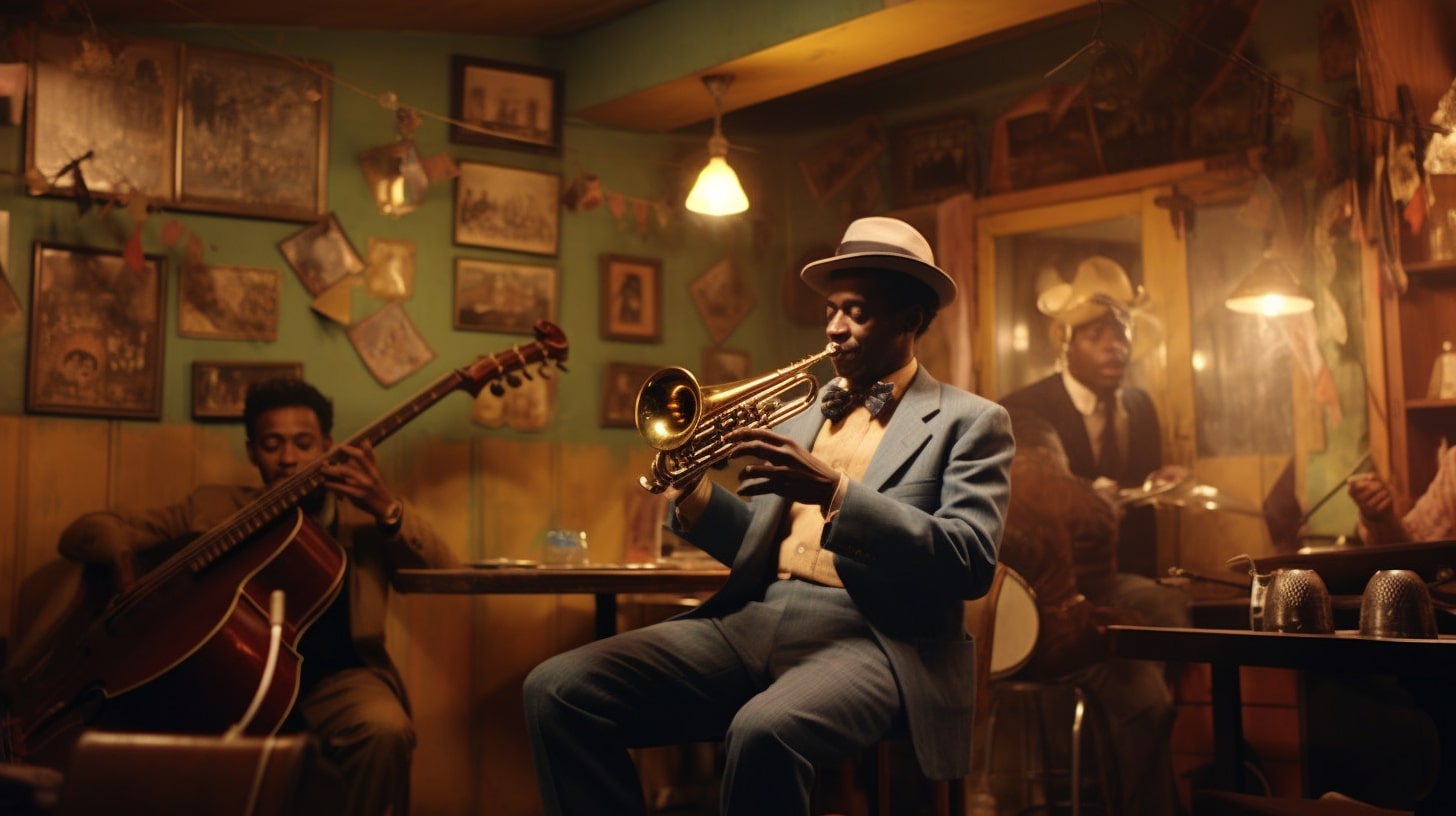Buddy Bolden is often considered the first person to play what later became known as jazz music. Known for his innovative and improvisational style, Buddy was a charismatic musician who left a lasting impact on the genre.
Through his passionate performances on the cornet and groundbreaking approach to band arrangement, Buddy Bolden laid the foundation for the jazz movement. His talent for improvisation and dedication to music influenced later generations of jazz musicians and contributed to the genre’s rich legacy.
Contents
Buddy Bolden and His Instrument
The Cornet
Charles “Buddy” Bolden, born in New Orleans in 1877, was a legendary musician known for playing the cornet. The cornet is a brass instrument similar to the trumpet but with a more conical bore. Bolden played the cornet with a unique style, characterized by his powerful, loud, and “wide-open” technique. He formed his own band around the mid-1890s, featuring various instruments such as the guitar, bass, clarinets, trombone, and drums.
Bolden’s band was known for their lively performances, with the cornet taking center stage. He often played to the fans, who would become so captivated to the point that they entered “the trance,” a state in which nothing mattered but the music.
Influence on Early Jazz
Buddy Bolden’s innovative approach to the cornet and his rearrangements of the typical New Orleans dance band is considered the first steps in the development of jazz music. He replaced the traditional string instruments with a rhythm section, while the front-line instruments consisted of clarinets, trombones, and his own cornet.
Bolden’s groundbreaking improvisational skills, showcased during his performances, contributed significantly to the evolution of jazz. His ability to sink into “the trance” and captivate his audience laid the groundwork for the improvisational aspect that defines the genre. The legacy of Buddy Bolden and his cornet playing continues to influence jazz music to this day.
Bolden’s Musical Career
New Orleans Jazz Scene
Charles “Buddy” Bolden, born in New Orleans in 1877, was a pioneering musician credited with starting the sounds that eventually became jazz. Bolden played the cornet, an instrument similar to the trumpet, and his powerful, distinctive playing style became an essential part of the New Orleans jazz scene. He was particularly known for experimenting with improvisation, a technique that later became a staple of jazz music.
Collaborations and Bands
In the early days of his career, Bolden played in various ensembles before forming his own band in the mid-1890s. The band’s lineup included a mix of instruments, such as the cornet, guitar, bass, clarinet, trombone, and drums. This unique combination of instruments allowed Bolden to create a unique performance and further develop his musical skills.
Buddy Bolden was an influential figure in the music community and inspired many aspiring musicians, such as Joe “King” Oliver. Bolden was able to make a name for himself by performing at popular venues in New Orleans, including Lincoln Park and Union Sons Hall. Bands led by Bolden and other pioneers in the New Orleans jazz scene laid the groundwork for the development of jazz as a distinct genre, eventually giving rise to legends like Louis Armstrong and Jelly Roll Morton.
Bolden’s Musical Style and Innovation
Ragtime
Buddy Bolden’s music was influenced by the popular genres of his time, such as ragtime. He incorporated elements of this syncopated, piano-based style into his band’s performances. The incorporation of ragtime’s rhythm and structure provided the framework for Bolden’s early jazz music, with elements that would later inspire musicians such as Jelly Roll Morton and Louis Armstrong.
Blues and Waltzes
Bolden’s musical innovations also stemmed from his incorporation of blues into his band’s repertoire. The addition of brass instruments playing the blues marked a significant departure from traditional ragtime, making the music more emotional and expressive. Bolden also drew from the waltz, a popular dance style at the time, incorporating its triple meter and elegance into his music, further contributing to the development of early jazz.
Improvisation
Improvisation was another key component of Buddy Bolden’s music. His ability to improvise on the cornet was groundbreaking, and his intuitive understanding of the music around him allowed him to create spontaneous melodies and harmonies that captivated audiences. Improvisation would become a vital aspect of jazz music, with later artists like Wynton Marsalis and Louis Armstrong expanding upon this foundational element.
Funky Butt
Buddy Bolden’s innovative style also gave birth to one of his most famous and enduring songs, known as “Funky Butt.” This tune showcased some elements that would become signature components of jazz, such as syncopation, call-and-response, and the incorporation of “blue notes.” The song’s unique blend of ragtime, blues, and improvisation would make it a lasting influence on the evolution of jazz.
In summary, Buddy Bolden, a cornet player, significantly contributed to the early development of jazz by drawing from ragtime, blues, and waltzes, as well as incorporating improvisation. Artists like Jelly Roll Morton, Wynton Marsalis, and Louis Armstrong were influenced by his groundbreaking music and continued to innovate in the world of jazz.
Buddy Bolden’s Personal Life
Women and Scandals
Buddy Bolden’s personal life was marked by relationships with women and scandals. Living in New Orleans, he often frequented the infamous red-light district, Storyville, which would later inspire his song “Buddy Bolden Blues.” Bolden’s lifestyle in Storyville led to numerous relationships with women, some of which resulted in scandals that would affect his musical career.
Mental Health Challenges
Unfortunately, Buddy Bolden’s life took a tragic turn as he struggled with mental health problems. He was known to suffer from schizophrenia and, at one point, was diagnosed with dementia praecox, an early term for the disorder. These issues eventually led to Bolden being institutionalized at the Louisiana State Insane Asylum.
His mental decline became so severe that he was unable to continue performing as a musician, and his influence on the world of jazz began to fade.
He would live out the remainder of his life within the asylum, with his health deteriorating until he passed away in 1931. Tragically, Bolden was laid to rest in an unmarked grave at the Holt Cemetery in New Orleans, Louisiana.
Legacy and Popular Culture
Influence on Future Jazz Musicians
Buddy Bolden, a cornet player, had a significant impact on the world of music and is credited with being the first person to play what later became known as jazz. His playing style was powerful, loud, and “wide open,” which helped him create a frenzy among his listeners. Bolden’s work as a pioneering musician in New Orleans led to the foundation of an entirely new genre, and his innovative improvisations heavily influenced generations of jazz musicians that followed.
Depictions in Movies, Books, and Songs
Buddy Bolden’s legacy has been explored in various forms of popular culture. His life and music were portrayed in the 2019 biographical film Bolden, directed by Daniel Pritzker, with Gary Carr in the title role. This film sheds light on Bolden’s significant contributions to jazz and provides insight into his personal struggles, including his eventual institutionalization at the Louisiana State Asylum.
In literature, Bolden’s life is explored in Michael Ondaatje’s novel Coming Through Slaughter. The book, a blend of fact and fiction, is a vivid portrayal of Bolden’s life in the vibrant early jazz scene in New Orleans.
Songs that reference or pay tribute to Bolden include “Buddy Bolden’s Blues,” also known as “Careless Love,” which is a traditional jazz song that has been performed by many artists over the years.
Bolden’s unrecorded legacy: It is worth noting that despite his significant contributions to music, no known recorded music by Bolden survives. Rumors persist that a phonograph cylinder featuring Bolden’s playing may exist, but thus far, no such recording has been discovered. As such, his impact and the memory of his performances live on through the stories and recollections of those who had the chance to witness his talent firsthand.
Overall, Buddy Bolden’s influence on jazz and popular culture can be seen through the musicians he inspired, the creative works that depict his life, and the lasting impact his performances had on those fortunate enough to hear them.


